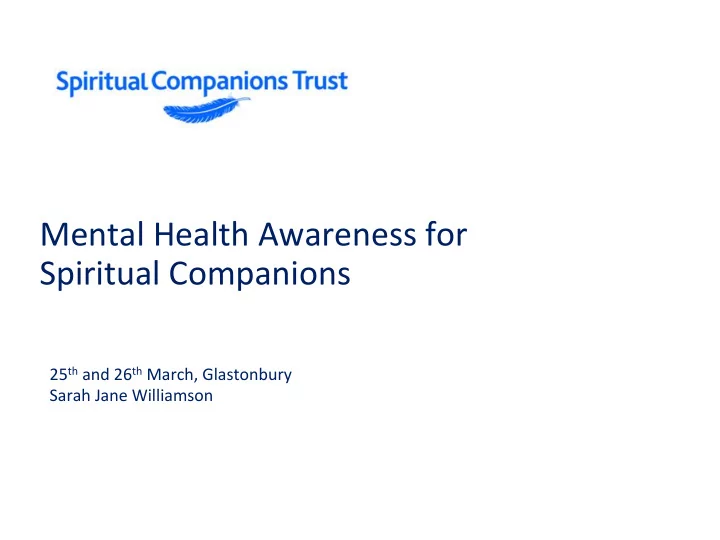

Mental Health Awareness for Spiritual Companions 25 th and 26 th March, Glastonbury Sarah Jane Williamson
2
3
‘ Greatest Briton’ poll, 2002, BBC2 1. Sir Winston Churchill (Depression/‘Black Dog’) 2. Isambard Kingdom Brunel (Heavy smoker) 3. Diana, Princess of Wales (Eating disorders) 4. Charles Darwin (Aspergers) 5. William Shakespeare (MPD?) 4
‘Only a man who could discern a gleam of hope in a hopeless situation was able to realistically assess the German threat and have the emotional reality to sustain us through 1940.’ Anthony Storr, Psychiatrist 5
Source: Asda website October 2013 6
Learning outcomes Spiritual Companions: Have a grounded and more realisGc understanding of spiritual • emergence gain a broader understanding of mental health and mental illness, • parGcularly from the mainstream point of view. have more confidence and competence both in companioning others • and communicaGng with mainstream mental health services. working publicly will understand about their responsibiliGes and • support available through the SC MH referral pathway.
For today • SC Guidelines • Limited Gme – training, not a process. • IdenGfy further development • ConfidenGality – self-responsibility • We are available now and later
Saturday Spectrum of mental health acGvity • The language of mental health and mental illness • Sunday What might we encounter as SCs? • Brain development, risk and resilience • Good care • SC mental health referral pathway • Silence, blessing, parGng •
Mental Health Awareness Training Sunday
Spiritual emergence has grace and ease. If spiritual emergence happens too much or too fast it can be overwhelming.
Comparative brain scans of 3 year olds Source: internet search, unknown comparative study of impact of neglect on children from Romania orphanages, Ceausescu regime 12
Mental health care – what’s the problem? • 33% people geUng no care • 33% people geUng wrong care • 33% people geUng right care Source: Rethink Mental Illness response to Mental health Taskforce Five Year Forward View report 2016
Mental health care – what’s the problem? Lack of parity with physical health despite ‘No health without mental health’ Department of Health, February 2011 SGll no legally enshrined right to MH care • No legal right to second opinion, emergency care or • therapeuGc support No system infrastructure or managed intelligence • network Report of Mental Health Taskforce 2016 recommendaGons to address these have now been accepted by NHS England and official bodies like CQC.
DetenGon under a secGon of the Mental Health Act: ‘When you or the people around you become frightened by your behaviour and their inability to support you so they bring in other people to control you.‘ Crisis recovery: • Time • Space • Support - therapeuGc, pracGcal, social, spiritual
Recommend
More recommend